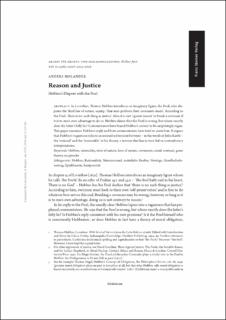Reason and Justice: Hobbes´s dispute with the Fool.
Peer reviewed, Journal article
Published version
Permanent lenke
https://hdl.handle.net/11250/3117499Utgivelsesdato
2023Metadata
Vis full innførselSamlinger
- Publikasjoner fra Cristin [3269]
- SPS - Documents [424]
Sammendrag
In Leviathan, Thomas Hobbes introduces an imaginary figure, the Fool, who disputes the third law of nature, saying: ‘that man perform their covenants made’. According to the Fool, ‘there is no such thing as justice’. Also, it is not ‘against reason’ to break a covenant if it is to one’s own advantage to do so. Hobbes claims that the Fool is wrong, but where exactly does the latter’s folly lie? Commentators have found Hobbes’s answer to be surprisingly vague. This paper examines Hobbes’s reply and how commentators have tried to assist him. It argues that Hobbes’s vagueness reflects an unresolved tension between - in the words of John Rawls - the ‘rational’ and the ‘reasonable’ in his theory, a tension that has in turn led to contradictory interpretations.
